The European Humanities University was founded in Minsk in 1992. EHU was the first educational institution in Belarus, modeled on prestigious foreign colleges and universities and based on a fundamental study of the humanities and social sciences. The new independent University proclaimed its mission to revive European values in Belarus during the transition from totalitarianism to an open and free civil society. However, the University’s educational efforts for democratic transformation met with active opposition and repressive pressure from the regime. After the University’s closure in 2004, EHU continued its work in Vilnius, with broad support from the Lithuanian government, the European Commission, and international foundations and organizations.
As the conference was opened, welcoming speeches were addressed to the audience by: EHU Rector, Prof. Dr. Sergey Ignatov; representative of Sviatlana Tsikhanouskaya’s Office, Professor at EHU Dr. Tatiana Shchyttsova; EHU founder, Prof. Dr. Anatoli Mikhailov; Chairperson of EHU Senate, Assoc. Prof. Dr. Liudmila Ulyashyna; Member of the European Parliament, Chairman of EHU Governing Board Mr. Andrius Kubilius.
“It’s my honor to meet all of you in such fabulous place where we can feel a breath of hundred years of history. The topic of today’s conference provides a great opportunity to talk about the special role and mission of university and education, especially the role of the universities in the world, where totalitarian regimes acting in very brutal way, using an instrument of violence for it’s predatory purpose.
I believe, most of you know that European Humanities University began its life in 1992 as a symbol. Belarus belongs to Europe and shares it’s values for centuries. With one hundred students studying a variety of degrees in two rooms, rented from National Academy of Sciences of Belarus, Minsk, university began increasing numbers of students and staff. As in early 1990’s everybody was trying to become a banker or a businessman and nobody paid attention to the basic roots of European civilization but EHU has had a vision that society should be built on a huge, rich, powerful, intellectual tradition and on the autonomy”, – said prof. Dr. Sergei Ignatov during his opening speech.
EHU founder prof. Dr. Anatoli Mikhailov emphasized that the University, despite unfavorable conditions, still managed to survive and continue to exist: “Let us recognize the fact it is highly unusual and even strange to participate at the celebration of the 30 years of existence of a university while being in educational space where universities are part of reality for many centuries. However, we are dealing here with a very particular case. We address ourselves to the institution that should have not existed at all. It was created in 1992, in the extremely unfavourable intellectual environment – in the country that became independent after the collapse of the Soviet Union and has faced huge challenges of its social transformation”.
“The Belarusian protest movement of 2020 and the severe political crisis in our country have given EHU’s new relevance as a Belarusian university in exile.
In the crisis situation, EHU immediately began to assist the repressed Belarusian scientists and students. And after the military invasion of the Russian army on the territory of Ukraine in February this year, the university offered its assistance for Ukrainian students”, – Prof. Dr. Tatiana Shchyttsova noted.
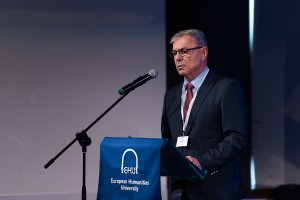
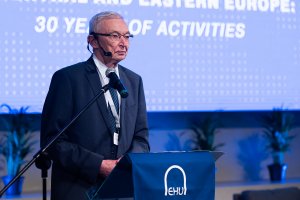
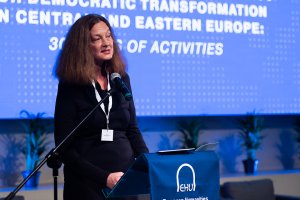
The conference program continued with two panel discussions. The first one, dedicated to strategies for universities to promote social and humanitarian functions in the context of democratic transformations in Central and Eastern Europe, was led by writer, journalist, civic activist, and soviet dissident Arkadijus Vinokuras. In the second panel discussion moderated by Prof. Dr. Tatiana Shchyttsova, topical issues of the role and significance of EHU for Belarus and the region were offered for discussion to the audience.
At the conclusion of the first day of the conference, Horton Beebe-Center, Chairman of the General Assembly of EHU Part-Owners, and Prof. Dan Davidson, President Emeritus of the American Councils for International Education, shared their vision on the strategic development of EHU as a leading regional educational and research center.
Previewing the documentary film about the history of the University, world-renowned expert on education and human rights, member of the EHU Governing Board, Prof. Dr. Jonathan Fanton, addressed the academic community with a video greeting.
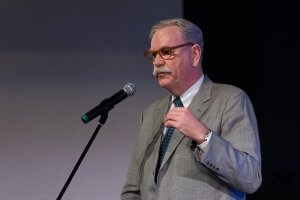


The screening was followed by the Honorary Awards for Friends and Partners of the EHU.
The second day of the conference was opened by Liudmila Ulyashyna, Chairperson of the EHU Senate, who gave an address on the language of academic freedom.
The discussion panel “The Belarusian civil society inside and outside Belarus: aims and challenges” was attended by representatives of international foundations, non-governmental organizations, and independent Belarusian media abroad.
The second day’s program included panel discussions by the Academic Department of Humanities and Arts (moderated by Assoc. Prof. Dr. Aliaksei Makhnach, head of the department) and the Academic Department of Social Sciences (moderated by Dr. Ingrida Danėlienė, head of the department, and Prof. Dr. Liliana Tymchenko), as well as a roundtable dedicated to the 500th anniversary of the publication of The Little Traveller’s Book by the outstanding European enlightener Francysk Skaryna.
In addition, a presentation of the book “At the origins of Belarusian political science” was held as part of the conference. One of the scientific editors of the publication, EHU Assoc. Prof. Dr. Uladzislaŭ Ivanoŭ, commented on the idea: “One of the goals of the book “At the origins of Belarusian political science”, which we designed and presented together with our colleague Dr. Andrei Stsiapanaŭ, was to show how useful political science knowledge is in understanding, theorising reality, as well as in elaborating behaviour and strategies both for citizens and groups (parties, movements)”.
Assoc. Prof. Dr. Uladzislaŭ Ivanoŭ notes: “EHU has become a rare alternative laboratory of Belarusian political knowledge, science and for decades has been developing a new Belarusian political science, which has absorbed the critical Western tradition and democratic searches, desires of Belarusian civil society and, in particular, political scientists (Iryna Buhrova, Viktar Čarnoŭ, Śviatlana Navumava, Uladzimir Roŭda and Siarhiej Pańkoŭski)”.
“The political science vector has always been a priority at EHU (both in the Minsk and Vilnius periods). Real political democratization is impossible without a developed democratic political science – it is often political scientists who develop theories and approaches that help the society and the system in general to democratize more quickly. Due to its privilege to be a private university and to exist in conditions of real democracy, EHU has just developed an independent political science and has played (has been playing) an important role in the process of democratic transformation of Belarus: it has prepared many specialists in political science, who has become leaders of civil society, parties, movements and expert communities”, – concludes Assoc. Prof. Dr. Uladzislaŭ Ivanoŭ.
The anniversary event ended with a ceremony of awarding the academic title of EHU professor. Siarhei Liubimau, Aliaksandr Puptsau and Sergei Seleckij became the holders of the honorary status.
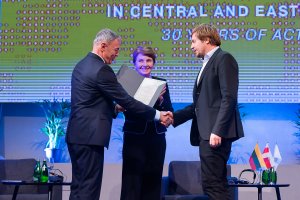
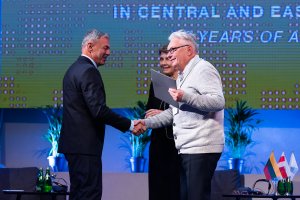
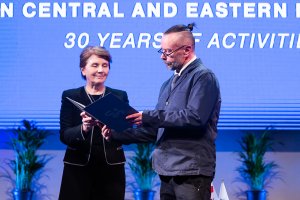
More photos on EHU’s official Facebook page.
